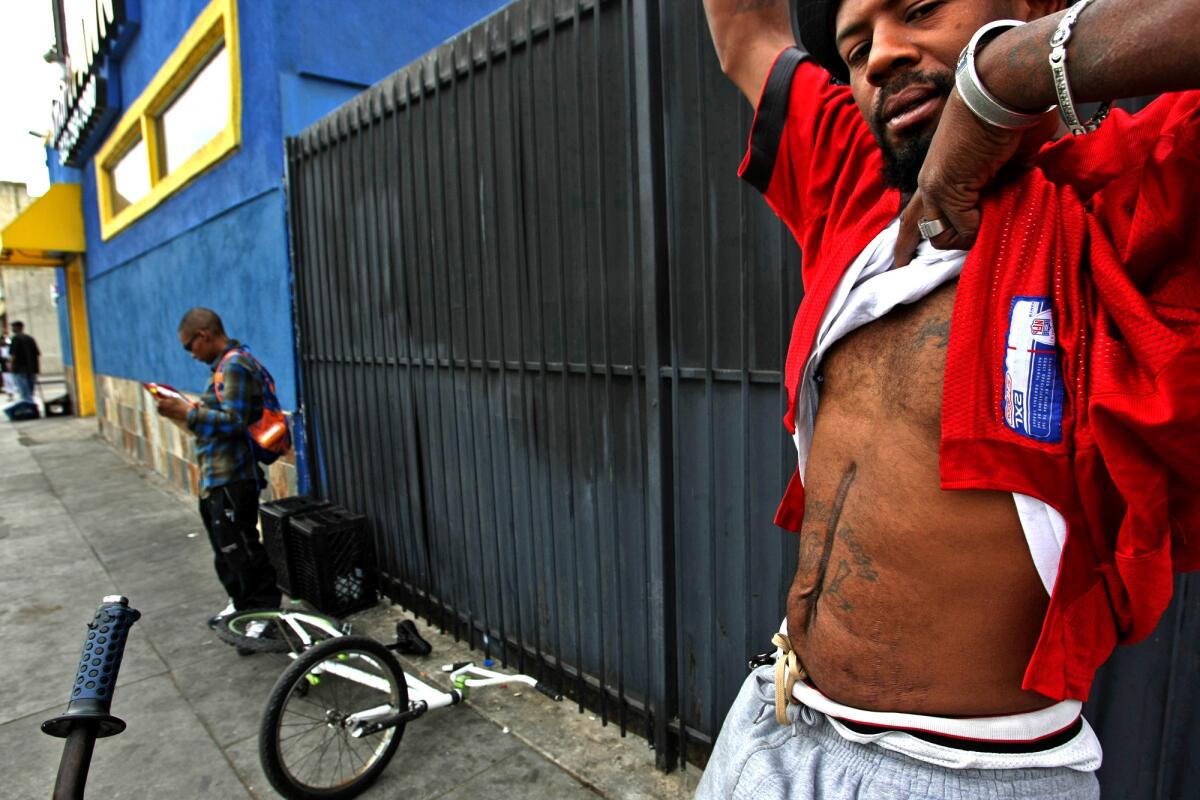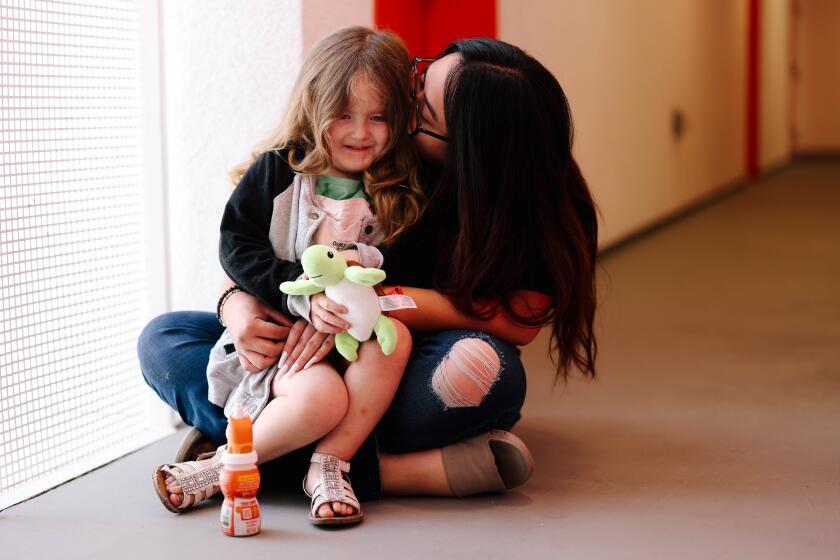LAPD recruits endure tough training, then hit reality on the streets
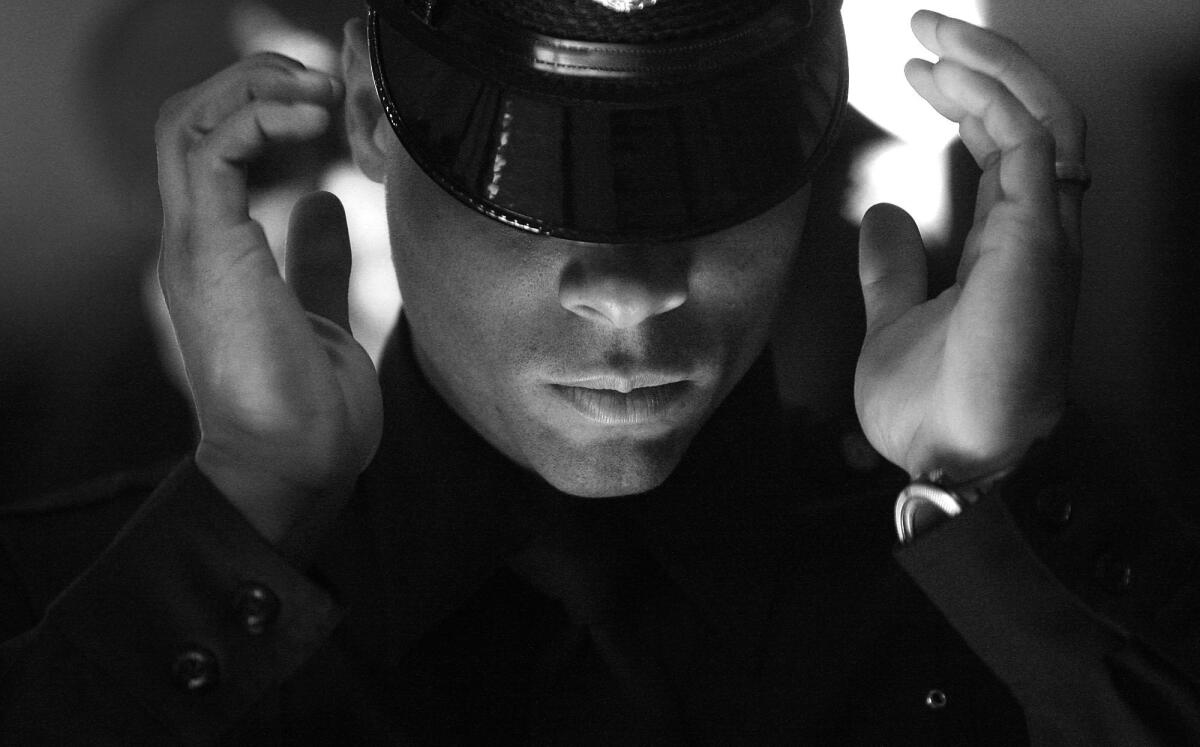
The LAPD academy class was a mix of people from different backgrounds struggling to make it through training together. For those who did, the streets of L.A. took the challenge to a new level.
Before they hit the streets as new cops, the recruits took a final run together.
It was a fitting end, given all the miles they had logged over the last six months. In a few days, they would graduate from the Los Angeles Police Department's training academy and scatter to stations throughout the city for their rookie years.
On this misty morning in November 2010, they sang like soldiers do as they jogged from a training facility near LAX to the beach. "Everywhere we go, people want to know who we are. So we tell them, 'We are the LAPD! Best department in the world!' "
In the front was Clay Bell, a young ex-Marine from Texas who had emerged early as the class leader. In the pack behind him, Ed Anderson sang the loudest. At 46, Anderson was the oldest in the class and the most unlikely cop among them. Vanessa Lopez lagged in the back. Lopez hated running. Barely cracking 5 feet, she had come to the LAPD after the Army told her she was too short to be a helicopter pilot. The LAPD had helicopters.
Feels like we're just getting started...like the hard part is only about to begin.”— Ed Anderson
"Up early with the California sun. Pride run! Last run! Oh, yeah! Almost done!"
They arrived at a bluff overlooking the Pacific and scrambled down to the beach. They stared out onto the water, each of them lost for a moment in their own thoughts. The quiet was broken when a few charged into the water. Others who held back were tossed in. Anderson walked up to Lopez. Still dry, she crossed her arms and shook her head.
They had come to the academy from different worlds — she was a Mexican American from Compton, Anderson a father of two from a wealthy Bay Area town.
They had forged a tight bond over the one thing they had in common: They wanted to be LAPD cops.
"It feels like we're just getting started," Anderson said. "Like the hard part is only about to begin."

The physical and mental pressure in the academy is intense. Days typically begin at 6 a.m. and run late into the day. At night, recruits are expected to do several hours of studying for the next day's classes.
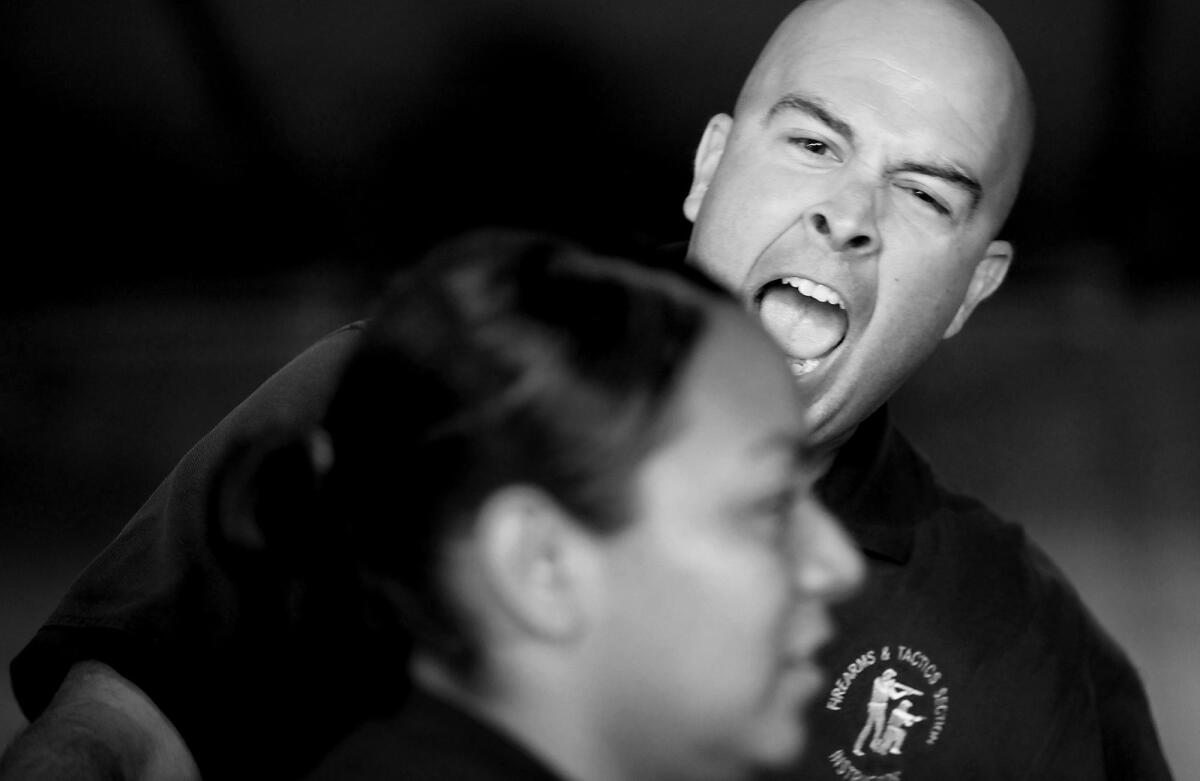
Recruit Gabriela Gomez readies a Taser as an instructor yells at her, trying to increase her stress level. More photos
Looming over each day is the constant threat of getting booted out: When a recruit fails a written exam or one of the frequent simulation exercises they are put through, he or she is allowed some time to study and then given the exam again. A second failure means immediate expulsion. There are no exceptions.
Bell almost didn't get in. He had bombed the written exam because of his poor writing skills. During the several months he was forced to wait before being allowed to try again, Bell enrolled in English classes at a local community college and passed the exam on the next try.
When the call finally came, Bell was in math class and had poor reception on his phone. He asked if he could call back.
The officer on the other end was blunt. "Son, you don't want to hang up on this call."
Once he was in the academy, things came easy to Bell. The place is run like the military — recruits don't do anything without orders from a drill instructor, mistakes are often punished with push-ups. Bell, who served two combat tours in Iraq as a squad leader, was well suited to it. During the first few weeks, when drill instructors went particularly rough on the class to weed out weak-willed recruits, he quietly became the one others looked to for guidance.
Anderson handled the physical demands of the academy and certainly was smart enough. But he seemed to want to succeed so badly that he often became flustered.
One morning, a few weeks into the academy, an instructor watched as Anderson struggled furiously to thread his holster and other equipment cases onto his thick leather utility belt. His grip was so tight that his hands trembled.
"Why all the hand shaking?"
"No excuse, ma'am."
"Well, that's not a reason. Relax…You're going to be handling a gun. All that shaking probably won't be helpful."
Lopez handled much of the work in the academy capably, but struggled on the firing range with the Glock .40-caliber handgun all recruits are issued. During one shooting lesson, she stood on the firing line and took aim at a paper target 10 yards away. She whispered to herself as she clenched and unclenched her hand around the grip of the gun, "Smooth, baby, smooth" — a mantra she used to calm her nerves.
Afterward, she sat on a bench dabbing blood from a spot on her thumb that she had rubbed raw from gripping the gun so tightly.
Lopez was called into a meeting with the head of the academy, who threatened her with expulsion if she didn't improve at marksmanship. "I left there with my tail between my legs," she recalled later. When it came time for the handgun shooting tests, she was far from the best in the class but managed to pass.
Along with Bell, Anderson and Lopez, 42 other recruits were in the class at the start — a diverse group of 30 men and 15 women. By the end, more than a quarter of them had either quit or been kicked out. For the ones who made it through, it would be one of the most physically and mentally exhausting periods of their lives.
But the academy was just practice. They hadn't yet faced the realities of being a Los Angeles cop — the violence, the low pay and the constant scrutiny from within. Could they make it?

A midlife crisis had delivered Anderson to the LAPD's doorstep.
He owned a market research firm and was living an idyllic life with his wife and two daughters a few minutes from the beach in Half Moon Bay. When he went with a client to a demonstration by a local department's SWAT officers, Anderson was enthralled, but he dismissed it as a job for someone 20 years younger.
A few years later, Anderson had become disillusioned with his work and the sense that it didn't amount to anything meaningful. He thought back to the day with the SWAT officers and decided to shut down his company.
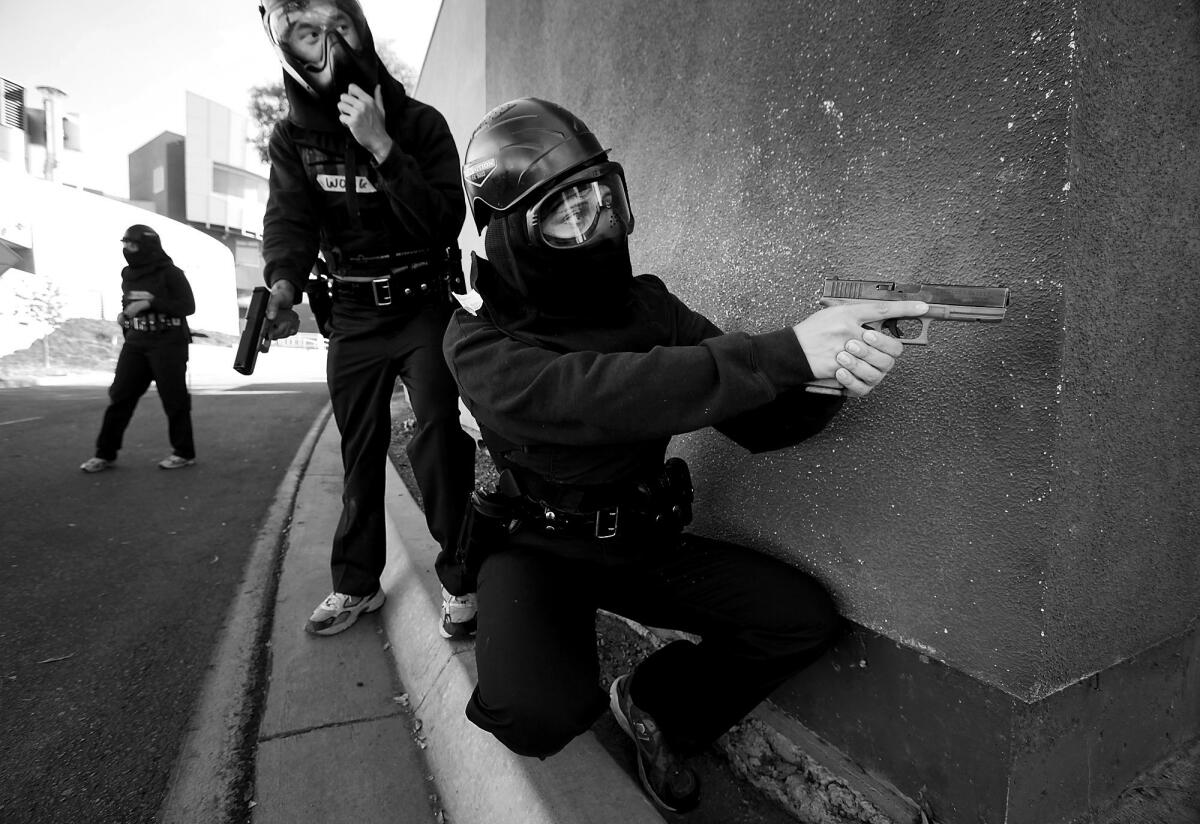
Police recruits use paintball guns to practice shooting scenarios.
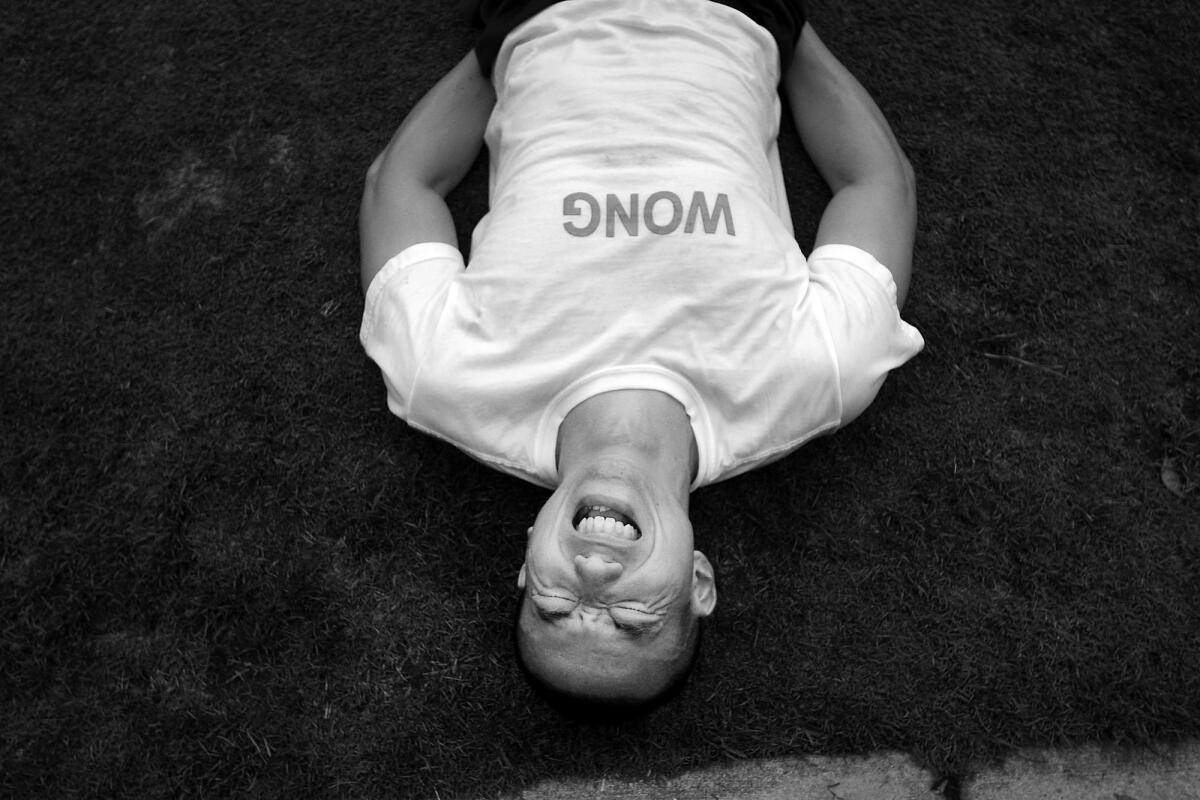
Recruit William Wong grimaces during physical fitness training.
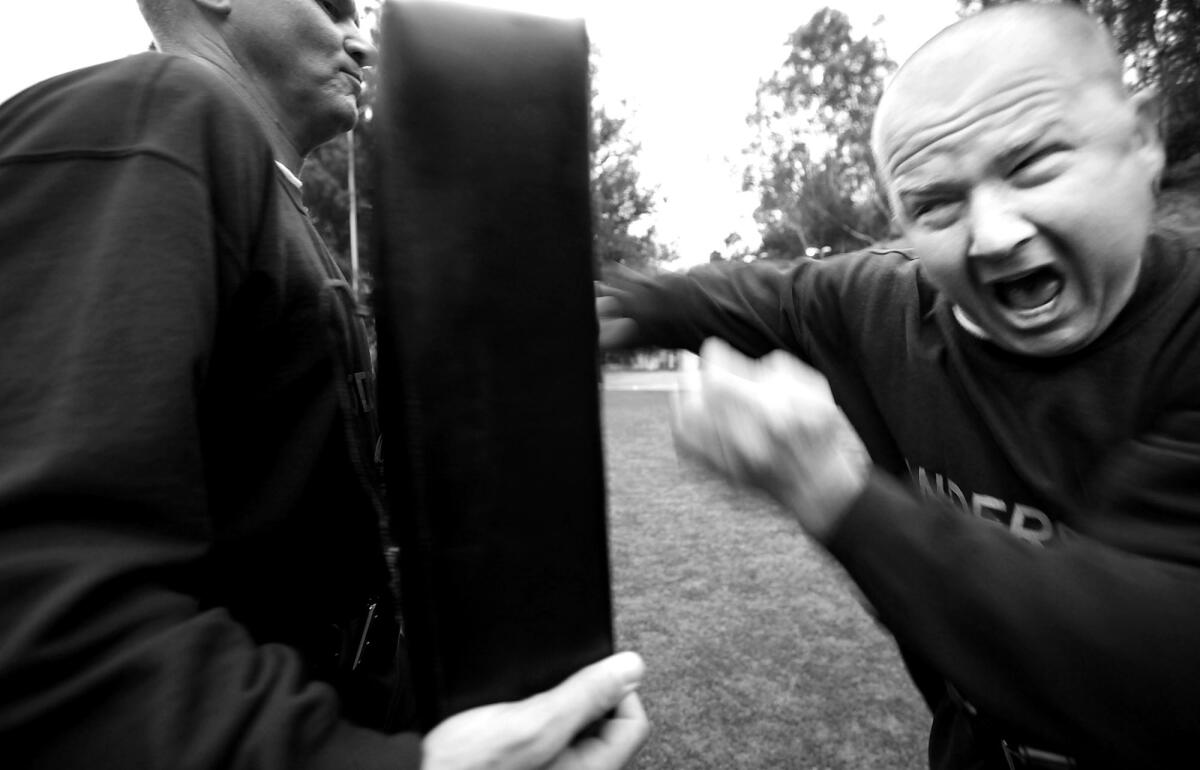
Recruit Ed Anderson throws punches during training.
"I wanted to have a job that in a tangible, hands-on way helps people," he said. "I know that sounds naive or idealistic, but I decided I couldn't ignore it."
Departments closer to home weren't hiring, and Anderson was drawn to the LAPD by its reputation in law enforcement circles as a highly trained force where cops get the excitement — and danger — that comes with policing in a big city. Leaving his family at home, Anderson moved in with his father, who lived in a condo in the South Bay.
At the academy, Anderson managed to calm down as the months passed and graduated filled with a sense of excitement and relief. A career change that had seemed absurd six months earlier had become a reality.
The excitement, however, faded quickly. LAPD patrol officers typically work three 12-hour shifts each week. Anderson figured he would work his shifts in a row and then make the six-hour drive for a few days at home. In reality, though, the routine was grueling. He would get off work as the sun was coming up and then hit the road. At home, he was torn between catching up on sleep or seeing his wife and children.
I stopped asking 'Why?' a while ago”— Clay Bell, LAPD officer of three years
At work, the exhaustion led to mistakes. He struggled to add up minutes and hours on the log every officer must use to account for what he did throughout a shift. He worried that it was a matter of time before he made a mistake on something bigger.
Despite all he had sacrificed, Anderson began to think about quitting. Classmates and officers at his station tried to persuade him to stay, but he was gone by June, seven months into his new career.
"It was the most painful decision by far I've ever made in my life," he said. "This is what I'd been working toward for years. I got it and then gave it up. I was devastated after I left."
Anderson now works for a private security firm in the Bay Area.

After finishing their rookie years, Lopez and Bell did mandatory stints in the department's jails and then were sent to new assignments as full-fledged cops. Bell went to the 77th Street Division, one of the city's roughest, as a patrol officer. Lopez joined the department's South Bureau Traffic Division, where officers deal mostly with car accidents and driving violations.
They realized early on that the academy had prepared them only to a point.
No amount of role-playing with paint-pellet guns could have taught Lopez how to control the adrenaline that coursed through her as she chased a man with a gun into the courtyard of a housing project on her first foot pursuit.
And nothing the drill instructors said could have readied Bell for the day he responded to the scene of a stabbing and found a woman had taken a knife to her sister's face because they were from rival gangs.
"I stopped asking 'Why?' a while ago," Bell said in an interview recently. "You can't if you want to do this job. There is no way to understand why and how people do the things that they do. You just have to accept that it is happening and that it will keep happening."
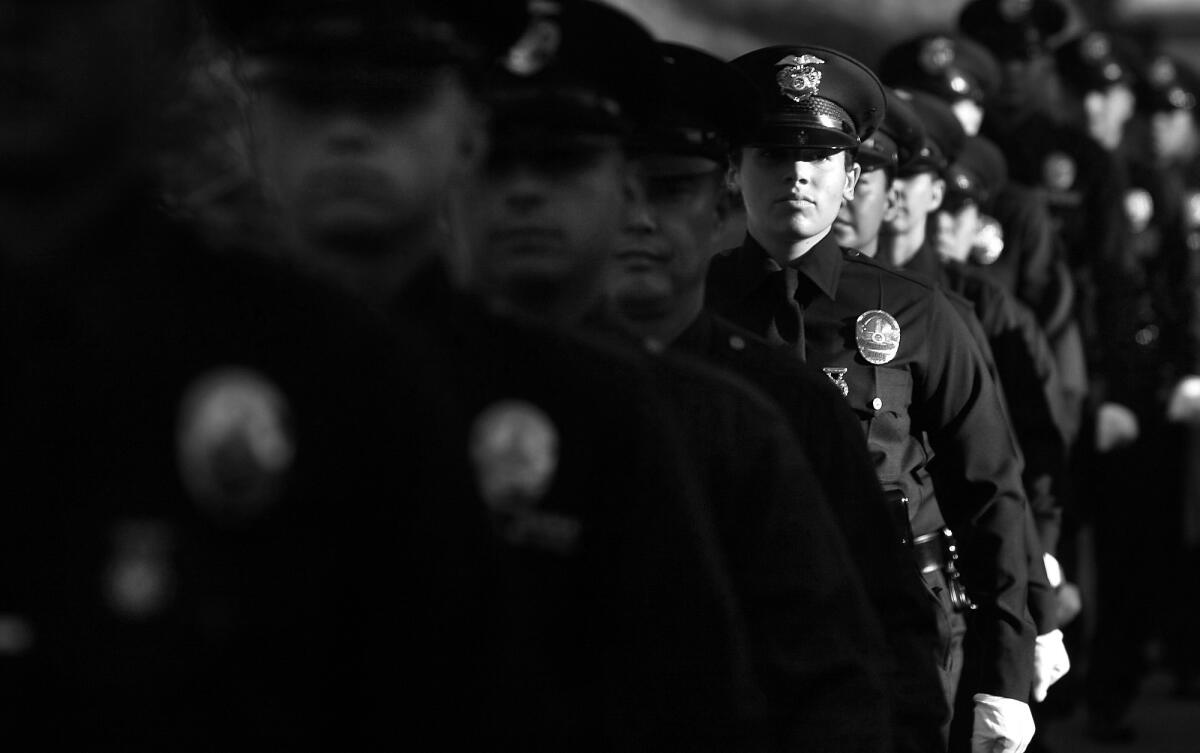
Members of the Los Angeles Police Department recruit class line up for graduation at the LAPD academy in Elysian Park. The class began with 46 recruits, but at the end of their training, only 30 would graduate. More photos
Bell and Lopez graduated from the academy with an idealism rooted in a desire to help people in need. With three years now behind them, that sense of purpose has been tested. Bell, who is black, patrols in South Los Angeles, where distrust among black Angelenos toward the LAPD runs deep. He has been called a traitor and been spit on by black people on the street.
"I'm only 27 years old," he said. "You go back 30 years and people have legitimate reasons not to like the department as an establishment. And we still feel that, because those people taught their kids about it and they carried it on."
As a young cop, Lopez has run up against what she and others describe as a divide between the old and new guards of the LAPD. On a scorching afternoon in August, she and her partner were flagged down by a 25-year veteran officer who had pulled over a Latina for a minor traffic violation. The woman, who had her toddler daughter in the car, didn't have a driver's license — a strong indication that she was in the country illegally. The motorcycle officer needed Lopez to translate for him.
"Tell her I'd be taking her to jail if it weren't for the little kid," he said harshly. He made the crying woman take her child out of the car and stand on the sidewalk in the 90-degree heat as he called for a tow truck after impounding the car.
Lopez, 29, translated dutifully, but inside she was seething. She didn't feel any kinship with the woman because they were both Latina. Instead, she saw the officer as a product of an different era in the LAPD, when cops were taught to take more of an "us vs. them" approach to policing.
The encounter brought back memories of how she was taught to think of cops growing up in Compton, where gangs tried to recruit young teenagers at school and her bathroom window looked out onto the alley where a neighborhood drug dealer did deals.
"Growing up, cops were frowned upon," she said.
She thought about the officer and said: "He didn't have to handle it like that. That's not the person I am, not the type of cop I want to be.… I've realized that if I want to make things better, I have to climb up the ranks and make changes from the inside."
More than anything, though, a dispute over money has clouded the future for Lopez and Bell.
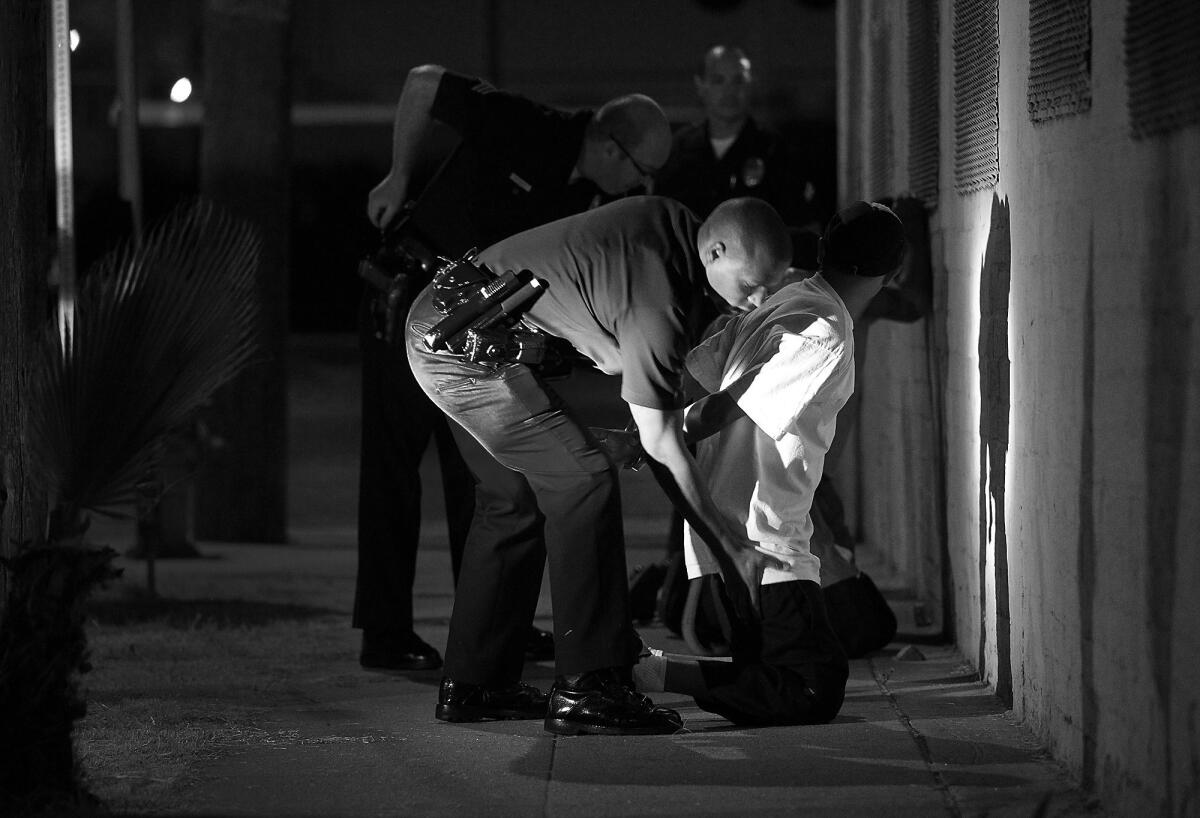
Officer Clay Bell pats down a suspected gang member while on patrol in the Newton Division. More photos
Around the time they joined the department, the union representing rank-and-file officers agreed to a 20% pay cut for new officers. Bell, Lopez and several other new officers said they were told repeatedly by recruiters and instructors at the academy that the lower salaries would be in effect only during their rookie years.
But the end of the first year came and went without a change in their paychecks, leaving the new officers with about $1,300 in take-home pay every two weeks. City and union officials today say that they are trying to resolve the problem.
"It wasn't the lack of pay so much as it was the lack of someone saying, 'We'll take care of this,' " Bell said. "Instead, it went to the back burner and stayed there."
Bell and Lopez said it's been nearly impossible to make ends meet on the lower pay. Besides Anderson, six other classmates have quit the LAPD.
"A supervisor once told me, 'Stick around here long enough and you'll forget crazier things than most people will ever experience in their lives.' And it's true," Bell said. "It's an experience. I want the experience, I want to be exposed as much as possible. But how much is too much?"
Bell has struggled with that question for months. Recently, he decided he had reached his limit. On Monday, he starts a new job with the Santa Monica Police Department.
All that remains is for him to turn in his LAPD badge and gun.
Follow Joel Rubin(@joelrubin) on Twitter
Follow @latgreatreads on Twitter
More great reads
In Torrance Police Dept., forensics is women's work
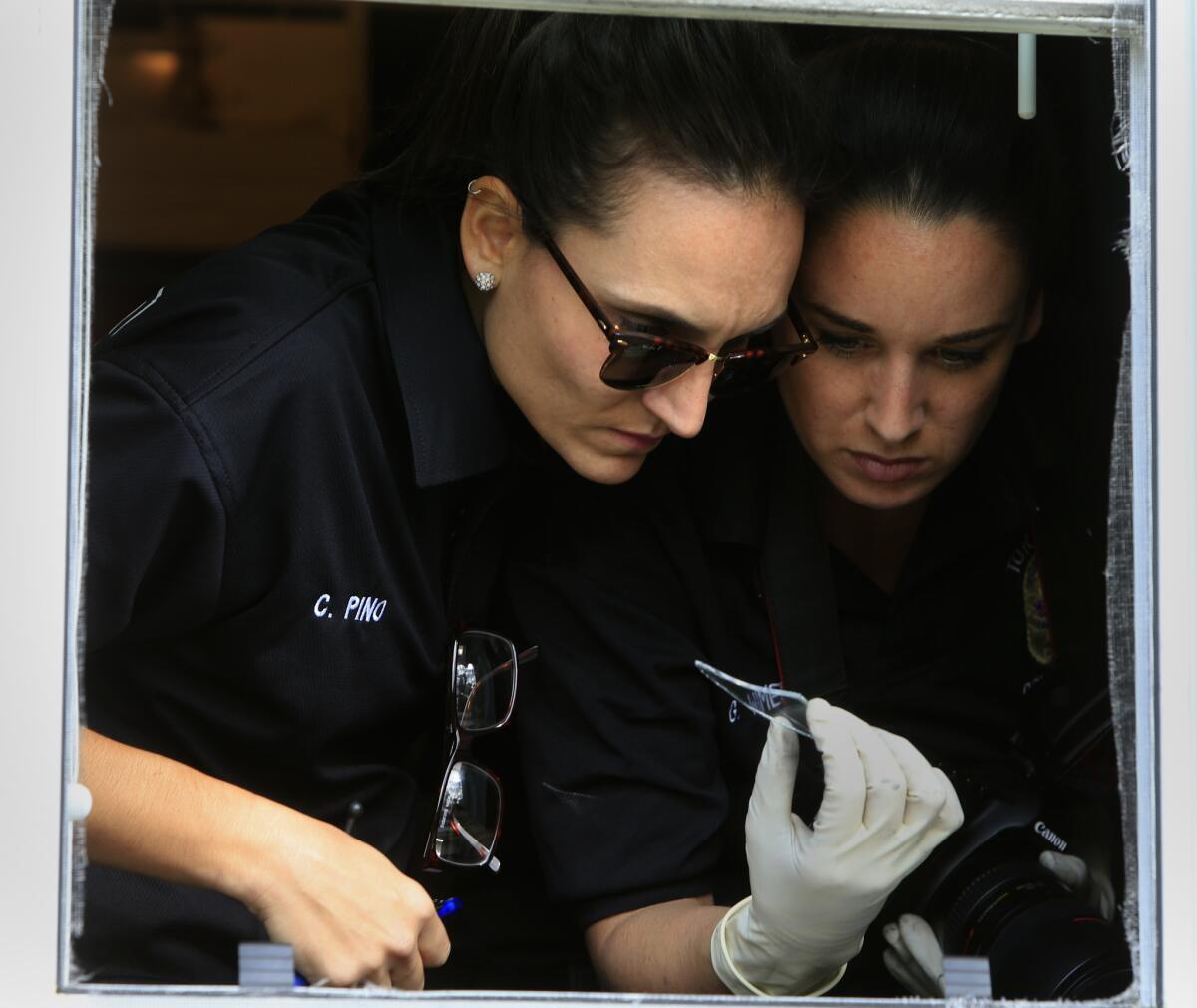
Start your day right
Sign up for Essential California for news, features and recommendations from the L.A. Times and beyond in your inbox six days a week.
You may occasionally receive promotional content from the Los Angeles Times.
